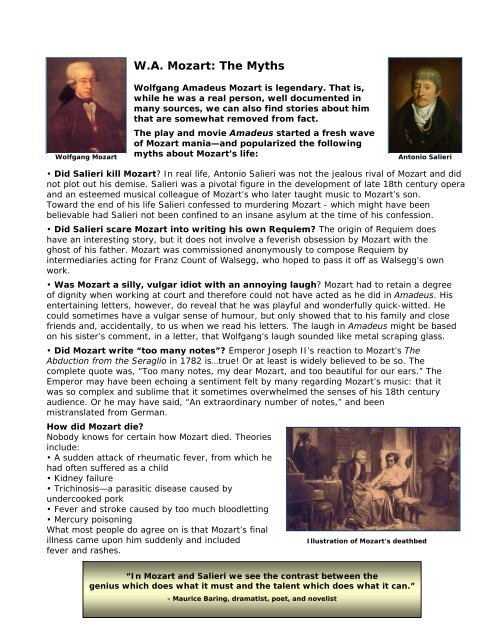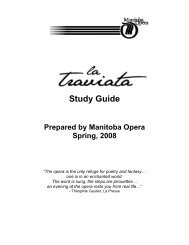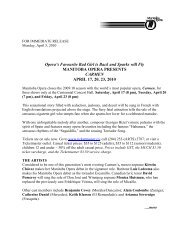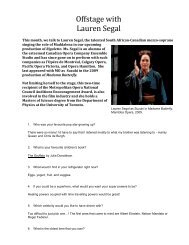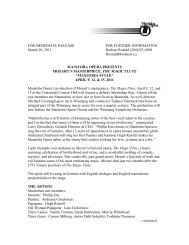The Magic Flute Study Guide - Manitoba Opera
The Magic Flute Study Guide - Manitoba Opera
The Magic Flute Study Guide - Manitoba Opera
Create successful ePaper yourself
Turn your PDF publications into a flip-book with our unique Google optimized e-Paper software.
W.A. Mozart: <strong>The</strong> Myths<br />
Wolfgang Amadeus Mozart is legendary. That is,<br />
while he was a real person, well documented in<br />
many sources, we can also find stories about him<br />
that are somewhat removed from fact.<br />
<strong>The</strong> play and movie Amadeus started a fresh wave<br />
of Mozart mania—and popularized the following<br />
myths about Mozart’s life:<br />
Wolfgang Mozart Antonio Salieri<br />
• Did Salieri kill Mozart? In real life, Antonio Salieri was not the jealous rival of Mozart and did<br />
not plot out his demise. Salieri was a pivotal figure in the development of late 18th century opera<br />
and an esteemed musical colleague of Mozart’s who later taught music to Mozart’s son.<br />
Toward the end of his life Salieri confessed to murdering Mozart - which might have been<br />
believable had Salieri not been confined to an insane asylum at the time of his confession.<br />
• Did Salieri scare Mozart into writing his own Requiem? <strong>The</strong> origin of Requiem does<br />
have an interesting story, but it does not involve a feverish obsession by Mozart with the<br />
ghost of his father. Mozart was commissioned anonymously to compose Requiem by<br />
intermediaries acting for Franz Count of Walsegg, who hoped to pass it off as Walsegg’s own<br />
work.<br />
• Was Mozart a silly, vulgar idiot with an annoying laugh? Mozart had to retain a degree<br />
of dignity when working at court and therefore could not have acted as he did in Amadeus. His<br />
entertaining letters, however, do reveal that he was playful and wonderfully quick-witted. He<br />
could sometimes have a vulgar sense of humour, but only showed that to his family and close<br />
friends and, accidentally, to us when we read his letters. <strong>The</strong> laugh in Amadeus might be based<br />
on his sister’s comment, in a letter, that Wolfgang’s laugh sounded like metal scraping glass.<br />
• Did Mozart write “too many notes”? Emperor Joseph II’s reaction to Mozart’s <strong>The</strong><br />
Abduction from the Seraglio in 1782 is…true! Or at least is widely believed to be so. <strong>The</strong><br />
complete quote was, “Too many notes, my dear Mozart, and too beautiful for our ears.” <strong>The</strong><br />
Emperor may have been echoing a sentiment felt by many regarding Mozart’s music: that it<br />
was so complex and sublime that it sometimes overwhelmed the senses of his 18th century<br />
audience. Or he may have said, “An extraordinary number of notes,” and been<br />
mistranslated from German.<br />
How did Mozart die?<br />
Nobody knows for certain how Mozart died. <strong>The</strong>ories<br />
include:<br />
• A sudden attack of rheumatic fever, from which he<br />
had often suffered as a child<br />
• Kidney failure<br />
• Trichinosis—a parasitic disease caused by<br />
undercooked pork<br />
• Fever and stroke caused by too much bloodletting<br />
• Mercury poisoning<br />
What most people do agree on is that Mozart’s final<br />
illness came upon him suddenly and included<br />
Illustration of Mozart's deathbed<br />
fever and rashes.<br />
“In Mozart and Salieri we see the contrast between the<br />
genius which does what it must and the talent which does what it can.”<br />
- Maurice Baring, dramatist, poet, and novelist<br />
17


